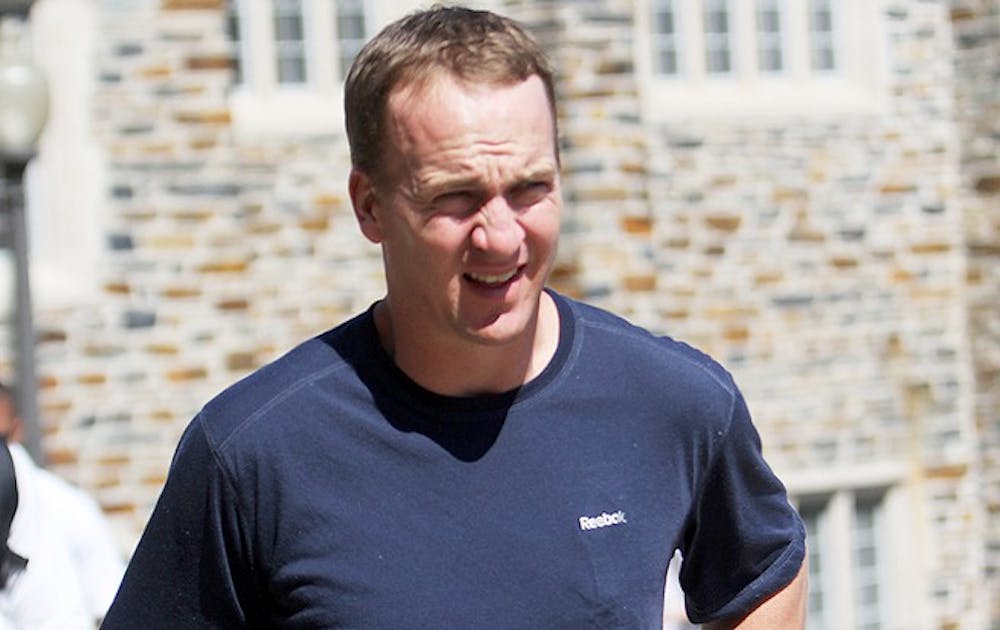In mid-March of 2012, Peyton Manning brought a massive media spotlight to Duke. When an intrepid blogger combed through public flight plan records to discover that the owner of the Denver Broncos was taking his private plane to Durham, where Manning-—arguably the most coveted free agent in NFL history-—was working out, hordes of media descended upon campus. A news helicopter tracked the SUVs carrying the Broncos’ delegation all the way from the tarmac at RDU to the Pascal Field House, where the team and Manning met for a workout.
But the media spotlight focused tightly on Manning himself and which team he would choose to join as a free agent. It was mentioned, but rarely headlined, that the future Hall of Fame quarterback chose to work out at Duke with head coach David Cutcliffe rather than an elite private facility or at Manning’s alma mater, Tennessee.
Working with Cutcliffe and the Duke staff on and off for five months, Manning successfully rehabbed from a career-threatening neck injury. The Duke equipment staff worked double-time providing for all of Manning’s needs while still preparing as normal for spring football practices. Cutcliffe, who was the Volunteers’ offensive coordinator and quarterback coach when Manning played there, allowed Manning to stay in his home and scheduled indoor workouts at night in order to protect the NFL star’s privacy. And yet through all of that, Duke got very little credit in the press for the role that it had played in the process.
This lack of attention was no fault of Manning’s, who sings the praises of Duke and Cutcliffe anytime he gets a chance. But most of the media simply didn’t seem very interested, and the contributions of Duke and its well-regarded head coach remained largely behind the scenes.
This spring, Eli Manning joined Peyton, along with six NFL wide receivers—three each from his Broncos and Eli’s New York Giants—to work out on-campus in preparation for the 2013 NFL season. Eli had also worked with Cutcliffe at Duke two years ago during the NFL lockouts.
Duke has gotten its name in a few more headlines this time around, now that the controversy and mystery surrounding Peyton’s free agency has passed. But still, since Duke isn’t exactly a football powerhouse, the Cutcliffe connection still almost always takes a back seat to stories about the Mannings and their professional exploits.
My question is: in the long run, will Cutcliffe and his staff be able to translate the Mannings’ experience at Duke into growth of the program? It’s neat that two of the NFL’s best quarterbacks like to come do their offseason tuning up here on campus, and the star quarterbacks were willing to allow a minimal amount of media access to their workouts in order to give the Blue Devils some positive press. Plus, the departed seniors from Duke’s roster get the benefit of working out with two of the best quarterbacks around as they prepare for the NFL Draft later this month.
But neither of those things provide a direct impact to Duke’s future, and Peyton said last week he wasn’t here shaking recruits hands. So it will be up to the coaching staff to find a way to spin the Mannings’ faith in Cutcliffe into a benefit which actually helps move the Duke program closer to national relevance.
Last year, recruiting analyst Dave Hooker told The Chronicle that “it’s only a matter of time” before Cutcliffe’s association with the Manning brothers entices a great quarterback to come to Duke. But it’s been five recruiting classes now for Cutcliffe, and while he has recruited admirably in a Southern high-school football landscape dominated by the SEC powers, he has yet to land a truly elite recruit who might take the program to the next level.
In fact, most of the quarterbacks Cutcliffe has landed have been anti-Mannings. The likes of Anthony Boone, Brandon Connette and Thomas Sirk are more mobile, dual-threat quarterbacks than prolific pocket passers who can pick apart a defense with their arms, as the Mannings did. This is not to say that Cutcliffe can only coach statuesque signal callers, but the greatest success stories of his coaching career have been elite passers.
Cutcliffe might already have his eye on a couple of men for the job, as he landed three-star quarterback Parker Boehme in the class of 2013 and has already made an offer to Arizona high-school star Kyle Allen, who is currently ranked No. 1 overall in the class of 2014 by Scout.com. Both Boehme and Allen have reputations as pocket passers rather than runners.
Allen must be one of at least a few developing quarterbacks out there who would consider the chance to join a program on the rise, where they can compete for a job right away rather than waiting behind their older predecessors at a more elite football school. To put Duke over the top, though, Cutcliffe would have to sell these recruits that the expertise he provided to the Mannings can benefit the next Cutcliffe quarterback as well.
The Mannings’ praises for Cutcliffe were sincere and impressive, as they called him a great coach, teacher and friend when they were on campus last week, but it remains to be seen whether press clippings can compete with the sort of on-campus experience that recruits will have when they visit schools with richer gridiron traditions and more vibrant football cultures.
If Cutcliffe and his staff can succeed in convincing a prospect that they can do for him what Cutcliffe did for the Mannings, perhaps there will be a story in which the spotlight is on Duke, while two of the most talented and likable NFL players applaud from behind the curtain.
Get The Chronicle straight to your inbox
Signup for our weekly newsletter. Cancel at any time.

